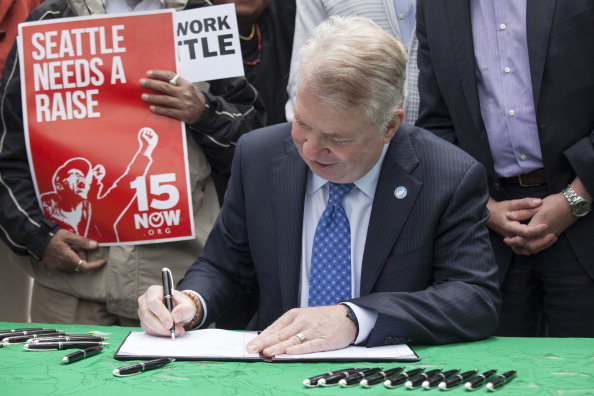Seattle's $15 minimum wage experiment might already be crashing and burning


A free daily email with the biggest news stories of the day – and the best features from TheWeek.com
You are now subscribed
Your newsletter sign-up was successful
A 2014 law designed to incrementally raise the minimum wage of Seattle's low-income workers up to $15 an hour has apparently backfired, a study conducted by University of Washington economists concluded. The findings show that low-wage employees actually lost an average of $125 a month under the new model, or about $1,500 a year, due to employers' reduced payrolls and hours.
Most alarmingly, "the paper's conclusions contradict years of research on the minimum wage," The Washington Post reports. "Many past studies, by contrast, have found that the benefits of increases for low-wage workers exceed the costs in terms of reduced employment — often by a factor of four or five to one."
Massachusetts Institute of Technology economist David Autor, who reviewed the paper, said the study strikes him as "likely to influence people" and called the work "very credible." "If I were a Seattle lawmaker, I would be thinking hard about the $15 an hour phase-in," said Autor.
The Week
Escape your echo chamber. Get the facts behind the news, plus analysis from multiple perspectives.

Sign up for The Week's Free Newsletters
From our morning news briefing to a weekly Good News Newsletter, get the best of The Week delivered directly to your inbox.
From our morning news briefing to a weekly Good News Newsletter, get the best of The Week delivered directly to your inbox.
Still, the research is in its early stages and has not yet been tested by peer review. But based on the preliminary findings, FiveThirtyEight suggests the Seattle experiment — with the highest minimum wage in the nation, at $13 an hour in 2016 — was possibly a case of being too extreme too quickly.
"The literature shows that moderate minimum wage increases seem to consistently have their intended effects, [but] you have to admit that the increases that we're now contemplating go beyond moderate," said economist Jared Bernstein, of the left-leaning Center on Budget and Policy Priorities. "That doesn't mean, however, that you know what the outcome is going to be. You have to test it, you have to scrutinize it, which is why Seattle is a great test case."
A free daily email with the biggest news stories of the day – and the best features from TheWeek.com
Jeva Lange was the executive editor at TheWeek.com. She formerly served as The Week's deputy editor and culture critic. She is also a contributor to Screen Slate, and her writing has appeared in The New York Daily News, The Awl, Vice, and Gothamist, among other publications. Jeva lives in New York City. Follow her on Twitter.
-
 What is the endgame in the DHS shutdown?
What is the endgame in the DHS shutdown?Today’s Big Question Democrats want to rein in ICE’s immigration crackdown
-
 ‘Poor time management isn’t just an inconvenience’
‘Poor time management isn’t just an inconvenience’Instant Opinion Opinion, comment and editorials of the day
-
 Bad Bunny’s Super Bowl: A win for unity
Bad Bunny’s Super Bowl: A win for unityFeature The global superstar's halftime show was a celebration for everyone to enjoy
-
 TikTok secures deal to remain in US
TikTok secures deal to remain in USSpeed Read ByteDance will form a US version of the popular video-sharing platform
-
 Unemployment rate ticks up amid fall job losses
Unemployment rate ticks up amid fall job lossesSpeed Read Data released by the Commerce Department indicates ‘one of the weakest American labor markets in years’
-
 US mints final penny after 232-year run
US mints final penny after 232-year runSpeed Read Production of the one-cent coin has ended
-
 Warner Bros. explores sale amid Paramount bids
Warner Bros. explores sale amid Paramount bidsSpeed Read The media giant, home to HBO and DC Studios, has received interest from multiple buying parties
-
 Gold tops $4K per ounce, signaling financial unease
Gold tops $4K per ounce, signaling financial uneaseSpeed Read Investors are worried about President Donald Trump’s trade war
-
 Electronic Arts to go private in record $55B deal
Electronic Arts to go private in record $55B dealspeed read The video game giant is behind ‘The Sims’ and ‘Madden NFL’
-
 New York court tosses Trump's $500M fraud fine
New York court tosses Trump's $500M fraud fineSpeed Read A divided appeals court threw out a hefty penalty against President Trump for fraudulently inflating his wealth
-
 Trump said to seek government stake in Intel
Trump said to seek government stake in IntelSpeed Read The president and Intel CEO Lip-Bu Tan reportedly discussed the proposal at a recent meeting
